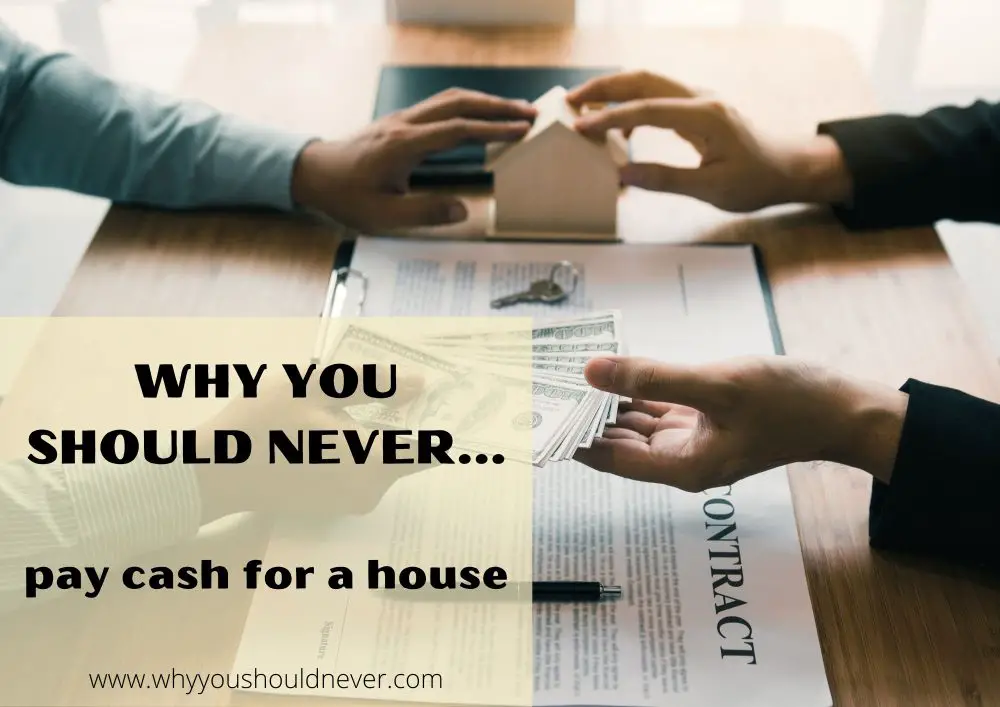![]()
Why You Should Never Pay Cash For A House
It’s no secret that buying a house is a huge investment. For most people, it’s the biggest purchase they’ll ever make. And while there are many different ways to finance a home purchase, one of the most popular methods is paying cash.
There are certain advantages to paying cash for a house. For starters, you won’t have to worry about making monthly mortgage payments. That can free up a lot of money each month that you can use for other things, like saving for retirement or investing in other assets.
Additionally, paying cash for a home can help you avoid paying interest on a mortgage. Over the life of a typical 30-year mortgage, you’ll end up paying tens of thousands of dollars in interest. But if you pay cash, you won’t have to worry about that expense.
There’s also the added benefit of avoiding a buying chain, which can often lead to delays and deals falling through, especially when mortgages are involved.
Now, that being said, there are also some significant drawbacks to paying cash for a house, all of which we’ll discuss in this article.
6 reasons why you shouldn’t pay cash for a house
1. You need lots of money upfront
Paying cash requires that you have a large amount of money saved up beforehand, which not everyone has. If you don’t already have the cash on hand, you may have to wait a while before you can buy your dream home outright.
House prices have been on the rise in recent years, so by the time you have enough funds to pay cash, the price of the house could have shot up. Waiting could end up costing you more in the long run.
2. It ties up your money
If you pay cash for a house, it ties up all your liquid assets in one huge investment, meaning that you likely won’t have any spare cash in case an emergency arises and you need quick access to funds.
3. You could miss out on other opportunities
If you have a large amount of money saved up, you may be better off investing it instead of using it to pay cash for a house. By investing your money, you could potentially earn a higher return than the interest you would save by paying cash for your home.
Additionally, if you keep your money in easy-to-access investment or savings accounts, you’ll still have access to it should another business opportunity present itself.
4. You could lose out on tax benefits
Depending on where you are in the world and what type of mortgage you take out, the interest you pay may be tax-deductible or entitle you to tax credits. This is true of buy-to-rent mortgages mostly. If you pay cash for a property, you won’t be able to take advantage of these benefits.
5. You could get stuck with a bad investment
Although cash buyers can often purchase houses at reduced rates, this doesn’t necessarily mean it’s a good investment.
In fact, if you’re not careful, you could end up paying too much for a home that ends up being worth less than what you paid, and you’ll be down a lot of money with no way to recoup your losses.
6. You might need that money for repairs
As any experienced buy will tell you, owning a home comes with all sorts of unexpected expenses, from broken appliances to unanticipated repairs. If you pay cash for your home and then have to spend a lot of money on repairing it, you could find yourself in a difficult financial situation.
Conclusion
As you can see, there are both pros and cons to paying cash for a house. Ultimately, whether or not it’s the right decision for you will come down to your personal financial circumstances and goals.
If you’re sure that paying cash is the right move for you, then go for it! But if not, don’t feel like you need to drain your savings account just to avoid getting a mortgage—there are other options available.
